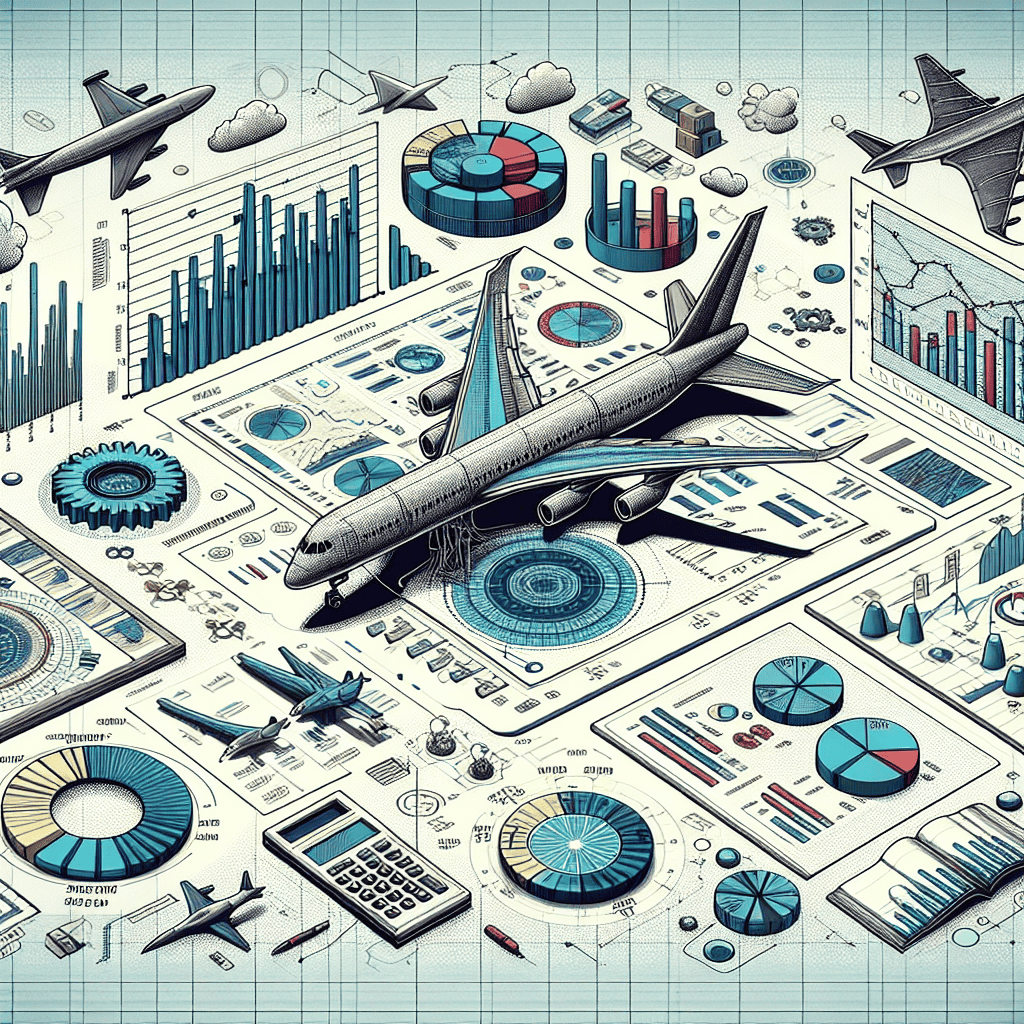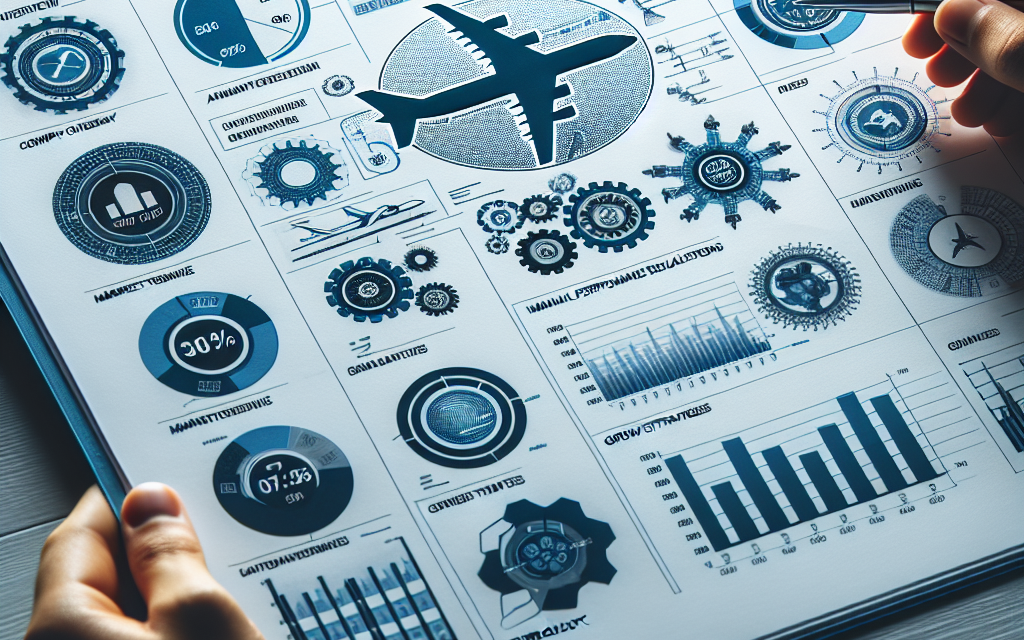“Boeing Co.: Navigating the Skies with Strategic Precision and Insightful Analysis”
Introduction
Boeing Co., a global aerospace leader, is a pivotal player in the aviation and defense sectors, renowned for its commercial jetliners, defense systems, and space exploration initiatives. Analysts closely monitor Boeing’s performance, given its significant influence on the aerospace industry and global economy. The company’s strategic initiatives, technological advancements, and market positioning are critical factors in its evaluation. Analysts assess Boeing’s financial health, competitive landscape, and innovation pipeline to provide insights into its future prospects. Key considerations include its ability to navigate supply chain challenges, regulatory environments, and geopolitical tensions, all of which impact its operational and financial outcomes.
Boeing’s Financial Performance: A Comprehensive Analysis
Boeing Co., a titan in the aerospace industry, has long been a focal point for investors and analysts alike, given its significant impact on both the commercial and defense sectors. In recent years, Boeing’s financial performance has been under intense scrutiny, particularly following the challenges it faced with the 737 Max crisis and the subsequent global pandemic that severely affected air travel. To understand Boeing’s current financial standing, it is essential to delve into various aspects of its performance, including revenue streams, cost management, and strategic initiatives.
Firstly, examining Boeing’s revenue composition provides insight into its financial health. The company operates primarily through three segments: Commercial Airplanes, Defense, Space & Security, and Global Services. Historically, the Commercial Airplanes segment has been the largest revenue generator, driven by the demand for new aircraft and fleet renewals. However, the grounding of the 737 Max and the COVID-19 pandemic led to a significant decline in orders and deliveries, impacting revenue. In contrast, the Defense, Space & Security segment has remained relatively stable, benefiting from long-term government contracts and a diversified portfolio that includes military aircraft, satellites, and missile defense systems. This stability has provided a buffer against the volatility in the commercial sector.
Transitioning to cost management, Boeing has undertaken several measures to streamline operations and reduce expenses. The company has implemented workforce reductions, facility consolidations, and supply chain optimizations to align its cost structure with the current market environment. These efforts are crucial in maintaining liquidity and ensuring long-term sustainability. Additionally, Boeing has focused on improving production efficiencies and reducing the time to market for new aircraft models, which are vital for enhancing profitability once demand rebounds.
Moreover, Boeing’s strategic initiatives play a pivotal role in shaping its financial trajectory. The company has been investing in innovation and technology to strengthen its competitive position. For instance, Boeing is advancing its digital transformation efforts, leveraging data analytics and artificial intelligence to optimize manufacturing processes and improve product quality. Furthermore, the development of sustainable aviation technologies, such as biofuels and electric propulsion systems, aligns with the industry’s shift towards reducing carbon emissions and meeting environmental regulations. These initiatives not only address current challenges but also position Boeing for future growth opportunities.
In addition to internal strategies, external factors also influence Boeing’s financial performance. The global economic environment, geopolitical tensions, and regulatory changes can significantly impact the aerospace industry. For example, trade policies and tariffs can affect supply chain dynamics and cost structures, while regulatory approvals are critical for the certification and delivery of new aircraft models. Therefore, Boeing must navigate these external challenges while executing its strategic plans.
In conclusion, Boeing Co.’s financial performance is a complex interplay of internal strategies and external factors. While the company has faced significant hurdles in recent years, its efforts to diversify revenue streams, manage costs, and invest in innovation are essential for its recovery and future growth. As the aerospace industry gradually recovers from the pandemic’s impact, Boeing’s ability to adapt and capitalize on emerging opportunities will be crucial in maintaining its leadership position. Analysts will continue to monitor these developments closely, providing insights into Boeing’s financial health and its prospects in an ever-evolving market landscape.
Evaluating Boeing’s Market Position in the Aerospace Industry
Boeing Co., a titan in the aerospace industry, has long been a subject of interest for analysts and investors alike. As one of the largest aerospace manufacturers in the world, Boeing’s market position is a critical indicator of the industry’s health and future direction. To evaluate Boeing’s standing, it is essential to consider several key factors, including its financial performance, competitive landscape, and strategic initiatives.
Financial performance is often the first metric analysts examine when assessing a company’s market position. Boeing’s revenue streams are primarily derived from its commercial airplanes, defense, space, and security segments. In recent years, the company has faced significant challenges, notably the grounding of the 737 MAX and the impact of the COVID-19 pandemic on air travel demand. These events have led to fluctuations in Boeing’s financial metrics, including revenue, profit margins, and cash flow. However, as global air travel gradually recovers, Boeing has shown signs of financial stabilization, with a focus on cost management and operational efficiency. Analysts are cautiously optimistic about Boeing’s ability to regain its financial footing, although they remain vigilant about potential risks, such as supply chain disruptions and regulatory hurdles.
In addition to financial performance, Boeing’s competitive landscape plays a crucial role in its market position. The aerospace industry is characterized by intense competition, with Airbus being Boeing’s primary rival. The duopoly between Boeing and Airbus has shaped the commercial aircraft market for decades, with each company vying for market share through innovation, pricing strategies, and customer relationships. Boeing’s recent efforts to enhance its product offerings, such as the development of the 777X and the potential launch of new aircraft models, are aimed at strengthening its competitive edge. Moreover, Boeing’s defense and space segments provide diversification, allowing the company to leverage its technological expertise across various domains. This diversification is particularly important as it mitigates the risks associated with the cyclical nature of the commercial aviation market.
Strategic initiatives are another critical aspect of Boeing’s market evaluation. The company has embarked on several initiatives to bolster its long-term growth prospects. For instance, Boeing is investing in sustainable aviation technologies, recognizing the growing importance of environmental considerations in the aerospace industry. By focusing on reducing carbon emissions and enhancing fuel efficiency, Boeing aims to align itself with global sustainability goals and meet the evolving demands of airlines and passengers. Additionally, Boeing’s digital transformation efforts, including the adoption of advanced manufacturing techniques and data analytics, are expected to enhance its operational capabilities and customer service.
Transitioning from strategic initiatives to broader industry trends, it is evident that Boeing’s market position is influenced by external factors such as geopolitical dynamics and regulatory developments. The aerospace industry is inherently global, with supply chains and customer bases spanning multiple countries. Consequently, trade policies, international relations, and regulatory changes can significantly impact Boeing’s operations and market access. Analysts closely monitor these external factors to assess their potential implications for Boeing’s market position and strategic decisions.
In conclusion, evaluating Boeing’s market position in the aerospace industry requires a comprehensive analysis of its financial performance, competitive landscape, strategic initiatives, and external influences. While challenges remain, Boeing’s resilience and adaptability position it well to navigate the complexities of the aerospace sector. As the industry continues to evolve, Boeing’s ability to innovate and respond to emerging trends will be pivotal in maintaining its status as a leader in the global aerospace market.
The Impact of Global Events on Boeing’s Business Strategy
Boeing Co., a titan in the aerospace industry, has long been a bellwether for global economic health and technological advancement. However, the company’s business strategy has been significantly influenced by a series of global events over the past few years. Understanding these impacts requires a nuanced analysis of how external factors have shaped Boeing’s strategic decisions and operational adjustments.
To begin with, the COVID-19 pandemic had a profound effect on the aviation industry, and Boeing was no exception. The sudden and severe decline in air travel demand led to a cascade of order cancellations and deferrals, forcing Boeing to reassess its production rates and workforce requirements. In response, Boeing implemented cost-cutting measures, including layoffs and a reduction in production of its flagship aircraft, the 787 Dreamliner. This strategic pivot was necessary to align with the reduced demand and preserve financial stability during an unprecedented downturn.
Moreover, the pandemic underscored the importance of diversifying revenue streams. Boeing’s defense and space segments became increasingly vital as commercial aviation revenues plummeted. The company intensified its focus on government contracts and space exploration initiatives, which provided a more stable financial foundation amidst the volatility of the commercial sector. This shift not only helped mitigate immediate financial pressures but also positioned Boeing to capitalize on long-term growth opportunities in defense and space markets.
In addition to the pandemic, geopolitical tensions have also played a critical role in shaping Boeing’s business strategy. Trade disputes, particularly between the United States and China, have introduced significant uncertainty into Boeing’s operations. China, being one of Boeing’s largest markets, is crucial for the company’s growth prospects. However, tariffs and political frictions have complicated sales and supply chain logistics. In response, Boeing has had to navigate these challenges by engaging in diplomatic efforts and exploring alternative markets to reduce dependency on any single region.
Furthermore, environmental concerns and regulatory pressures have increasingly influenced Boeing’s strategic direction. The global push towards sustainability has prompted Boeing to invest in research and development of more fuel-efficient and environmentally friendly aircraft. The company’s commitment to reducing carbon emissions is evident in its development of the 777X, which promises improved fuel efficiency and reduced environmental impact. This strategic focus not only addresses regulatory requirements but also aligns with the growing demand from airlines for greener technologies.
Additionally, the competitive landscape in the aerospace industry has been reshaped by these global events. Boeing faces intensified competition from Airbus, which has capitalized on Boeing’s challenges to expand its market share. In response, Boeing has prioritized innovation and customer engagement to maintain its competitive edge. The company has accelerated efforts to enhance its digital capabilities, streamline operations, and improve customer service, all of which are crucial for retaining customer loyalty and attracting new business.
In conclusion, Boeing’s business strategy has been significantly impacted by a confluence of global events, including the COVID-19 pandemic, geopolitical tensions, and environmental imperatives. These factors have necessitated strategic adjustments across various facets of the company, from production and workforce management to market diversification and technological innovation. As Boeing navigates these challenges, its ability to adapt and evolve will be critical in maintaining its leadership position in the aerospace industry. The company’s strategic responses not only reflect its resilience but also underscore its commitment to long-term growth and sustainability in an ever-changing global landscape.
Technological Innovations and Advancements at Boeing

Boeing Co., a titan in the aerospace industry, has long been at the forefront of technological innovation and advancement. As the company continues to navigate the complexities of modern aviation, analysts are keenly observing its strategic initiatives and technological developments. These innovations not only shape Boeing’s competitive edge but also influence the broader aerospace sector. To understand the current trajectory of Boeing’s technological advancements, it is essential to delve into several key areas where the company is making significant strides.
One of the most notable areas of innovation at Boeing is its commitment to sustainable aviation. As environmental concerns become increasingly pressing, Boeing has prioritized the development of more fuel-efficient aircraft. The introduction of the Boeing 787 Dreamliner, for instance, marked a significant leap forward in this regard. Utilizing advanced composite materials, the Dreamliner is lighter and more fuel-efficient than its predecessors, reducing both operational costs and environmental impact. This focus on sustainability is further exemplified by Boeing’s investment in alternative fuels and its collaboration with industry partners to develop sustainable aviation fuel (SAF) solutions.
In addition to sustainability, Boeing is also advancing its capabilities in digital technology and data analytics. The integration of digital tools into aircraft design and manufacturing processes has revolutionized the way Boeing operates. By leveraging big data and predictive analytics, Boeing can enhance the efficiency and reliability of its aircraft. This digital transformation extends to the maintenance and operation of aircraft as well, with Boeing’s digital solutions providing airlines with real-time data to optimize performance and reduce downtime. Such innovations not only improve the customer experience but also contribute to the overall safety and efficiency of air travel.
Moreover, Boeing’s advancements in autonomous technology are garnering significant attention. The company is actively exploring the potential of autonomous flight systems, which could redefine the future of aviation. By investing in research and development, Boeing aims to create systems that enhance pilot assistance and, eventually, enable fully autonomous flights. This pursuit of autonomy is not limited to commercial aviation; Boeing is also applying these technologies to its defense and space divisions, where autonomous systems can play a crucial role in mission success.
Transitioning from autonomous technology, Boeing’s efforts in the realm of space exploration are equally noteworthy. The company’s involvement in NASA’s Artemis program, which aims to return humans to the Moon, highlights its commitment to pushing the boundaries of space travel. Boeing’s development of the Space Launch System (SLS), a powerful rocket designed for deep space missions, underscores its leadership in this domain. By contributing to such ambitious projects, Boeing not only advances its technological capabilities but also inspires future generations of engineers and scientists.
In conclusion, Boeing Co.’s technological innovations and advancements are pivotal to its sustained success and influence in the aerospace industry. Through its focus on sustainability, digital transformation, autonomous technology, and space exploration, Boeing is setting new standards for what is possible in aviation and beyond. As analysts continue to evaluate Boeing’s strategic direction, it is clear that the company’s commitment to innovation will remain a driving force in shaping the future of aerospace. With each technological breakthrough, Boeing not only enhances its own competitive position but also contributes to the evolution of the entire industry, paving the way for a more sustainable, efficient, and exciting future in aviation.
Boeing’s Competitive Landscape: Key Players and Market Share
Boeing Co., a titan in the aerospace industry, has long been a pivotal player in the global market, competing fiercely with other major entities. Understanding Boeing’s competitive landscape requires a comprehensive analysis of its key players and market share dynamics. The aerospace sector is characterized by a few dominant companies, with Boeing and Airbus SE leading the charge. These two giants have been in a duopoly for decades, controlling a significant portion of the commercial aircraft market. However, the competitive landscape is gradually evolving, with new entrants and existing players striving to capture a share of this lucrative market.
Airbus, Boeing’s primary competitor, has consistently challenged Boeing’s market dominance. The rivalry between these two companies is intense, with each vying for contracts from major airlines worldwide. Airbus has made significant strides in recent years, particularly with its A320neo family, which has been well-received for its fuel efficiency and advanced technology. This has allowed Airbus to gain a substantial market share, often surpassing Boeing in annual aircraft deliveries. The competition between Boeing and Airbus is not just about numbers; it also involves innovation, customer service, and strategic partnerships, all of which play crucial roles in determining market leadership.
In addition to Airbus, other players are emerging on the global stage, seeking to disrupt the Boeing-Airbus duopoly. Companies like Embraer and Bombardier have carved out niches in the regional and smaller aircraft markets. While they do not directly compete with Boeing’s larger models, their presence is significant in the overall aerospace ecosystem. Furthermore, the rise of Chinese manufacturer COMAC and Russia’s United Aircraft Corporation (UAC) signals a shift in the competitive dynamics. These companies are backed by their respective governments and are making concerted efforts to develop aircraft that can compete on a global scale. COMAC’s C919, for instance, is designed to challenge the Boeing 737 and Airbus A320 families, although it still faces hurdles in terms of certification and global acceptance.
Boeing’s market share is also influenced by its strategic decisions and ability to adapt to changing market conditions. The company has faced challenges in recent years, notably with the grounding of the 737 MAX following two fatal crashes. This incident not only affected Boeing’s reputation but also allowed competitors to capitalize on the situation. However, Boeing has been working diligently to address these issues, focusing on safety enhancements and rebuilding trust with airlines and regulators. The company’s resilience and commitment to innovation are critical factors in maintaining its competitive edge.
Moreover, Boeing’s defense and space divisions contribute significantly to its overall market position. While commercial aircraft dominate the headlines, Boeing’s involvement in military and space projects provides a diversified revenue stream and enhances its competitive standing. The company’s expertise in these areas allows it to leverage technology and resources across different sectors, creating synergies that benefit its commercial operations.
In conclusion, Boeing’s competitive landscape is shaped by a combination of established rivals, emerging players, and internal strategic initiatives. The company’s ability to navigate this complex environment will determine its future market share and influence in the aerospace industry. As the sector continues to evolve, Boeing must remain vigilant, innovative, and responsive to maintain its position as a leader in the global market.
Sustainability Initiatives and Environmental Impact of Boeing
Boeing Co., a global leader in aerospace manufacturing, has increasingly focused on sustainability initiatives and reducing its environmental impact. As the aviation industry faces mounting pressure to address climate change, Boeing has taken significant steps to align its operations with global sustainability goals. Analysts have been closely monitoring these efforts, evaluating their effectiveness and potential impact on the company’s long-term success.
One of Boeing’s primary sustainability initiatives is its commitment to achieving net-zero carbon emissions by 2050. This ambitious goal reflects the company’s recognition of the urgent need to address the environmental challenges posed by the aviation sector. To achieve this target, Boeing is investing in the development of more fuel-efficient aircraft, exploring alternative fuels, and enhancing operational efficiencies. These efforts are not only crucial for reducing the company’s carbon footprint but also for maintaining its competitive edge in an industry that is increasingly prioritizing sustainability.
In addition to its focus on carbon emissions, Boeing is also addressing other environmental concerns, such as waste reduction and resource conservation. The company has implemented various programs aimed at minimizing waste generated during the manufacturing process and promoting the recycling and reuse of materials. By adopting a circular economy approach, Boeing seeks to reduce its reliance on finite resources and minimize its environmental impact. Analysts have noted that these initiatives not only contribute to environmental sustainability but also offer potential cost savings, which could enhance Boeing’s financial performance.
Moreover, Boeing’s commitment to sustainability extends beyond its own operations. The company is actively collaborating with industry partners, governments, and research institutions to advance sustainable aviation technologies. Through partnerships and joint ventures, Boeing is working to accelerate the development and deployment of innovations such as electric and hybrid-electric propulsion systems. These technologies have the potential to revolutionize the aviation industry by significantly reducing emissions and noise pollution. Analysts view these collaborations as a strategic move that positions Boeing as a leader in the transition to a more sustainable aviation future.
However, while Boeing’s sustainability initiatives are commendable, analysts have also identified challenges that the company must address to achieve its environmental goals. One such challenge is the need for substantial investment in research and development to bring new technologies to market. This requires not only financial resources but also a commitment to fostering a culture of innovation within the company. Additionally, the successful implementation of sustainable practices across Boeing’s global supply chain is critical. Ensuring that suppliers adhere to the same environmental standards is essential for achieving a truly sustainable operation.
Furthermore, regulatory and policy frameworks play a significant role in shaping the aviation industry’s sustainability landscape. Boeing must navigate a complex web of international regulations and standards, which can vary significantly across regions. Analysts emphasize the importance of proactive engagement with policymakers to advocate for supportive policies that facilitate the adoption of sustainable technologies and practices.
In conclusion, Boeing Co.’s sustainability initiatives and efforts to reduce its environmental impact are integral to its long-term strategy. By investing in innovative technologies, promoting resource conservation, and collaborating with industry stakeholders, Boeing is positioning itself as a leader in sustainable aviation. While challenges remain, the company’s commitment to sustainability is a positive step towards addressing the environmental challenges facing the aviation industry. As analysts continue to evaluate Boeing’s progress, the company’s ability to balance environmental responsibility with financial performance will be a key determinant of its future success.
Future Growth Prospects and Challenges for Boeing Co
Boeing Co., a titan in the aerospace industry, has long been a subject of interest for analysts and investors alike. As the company navigates the complexities of the modern aviation landscape, understanding its future growth prospects and challenges becomes crucial. Analysts often highlight Boeing’s robust order backlog as a key indicator of its potential for sustained growth. With a diverse portfolio that includes commercial airplanes, defense, space, and security systems, Boeing is well-positioned to capitalize on the increasing global demand for air travel and defense capabilities. The resurgence of air travel post-pandemic has been a significant boon for Boeing, as airlines worldwide seek to modernize and expand their fleets to accommodate growing passenger numbers. This trend is expected to continue, driven by emerging markets in Asia and the Middle East, where economic growth is fueling an increase in air travel.
Moreover, Boeing’s strategic investments in innovation and technology are likely to play a pivotal role in its future success. The company’s focus on developing more fuel-efficient and environmentally friendly aircraft aligns with the industry’s shift towards sustainability. Initiatives such as the development of the Boeing 777X, which promises improved fuel efficiency and reduced emissions, underscore Boeing’s commitment to meeting the evolving needs of its customers while addressing environmental concerns. Additionally, Boeing’s ventures into autonomous flight technology and advanced manufacturing techniques are expected to enhance its competitive edge in the aerospace sector.
However, despite these promising prospects, Boeing faces several challenges that could impact its growth trajectory. The company is still recovering from the reputational and financial fallout of the 737 MAX crisis, which led to significant scrutiny and regulatory hurdles. Restoring trust with regulators, customers, and the public remains a critical task for Boeing, as it seeks to ensure the safety and reliability of its aircraft. Furthermore, the aerospace industry is characterized by intense competition, with Airbus, Boeing’s primary rival, consistently vying for market share. Airbus’s advancements in aircraft technology and its strong presence in key markets pose a formidable challenge to Boeing’s dominance.
In addition to competitive pressures, Boeing must navigate the complexities of global supply chain disruptions, which have been exacerbated by geopolitical tensions and the lingering effects of the COVID-19 pandemic. These disruptions have led to delays in production and delivery schedules, impacting Boeing’s ability to meet customer demands promptly. Addressing these supply chain challenges will be essential for Boeing to maintain its operational efficiency and uphold its commitments to clients.
Furthermore, the evolving regulatory landscape presents another layer of complexity for Boeing. As governments worldwide implement stricter environmental regulations and safety standards, Boeing must ensure compliance while continuing to innovate. Balancing these regulatory requirements with the need for technological advancement will be a delicate task for the company.
In conclusion, Boeing Co. stands at a critical juncture, with significant opportunities for growth tempered by formidable challenges. The company’s ability to leverage its strengths, such as its extensive order backlog and commitment to innovation, will be crucial in navigating the competitive and regulatory landscape. Simultaneously, addressing the lingering effects of past crises and adapting to the dynamic global environment will be essential for Boeing to secure its position as a leader in the aerospace industry. As analysts continue to evaluate Boeing’s prospects, the company’s strategic decisions in the coming years will undoubtedly shape its future trajectory.
Q&A
1. **What is Boeing Co.’s primary business focus?**
Boeing Co. is primarily focused on aerospace and defense, manufacturing commercial jetliners, military aircraft, satellites, and related products and services.
2. **How has Boeing’s financial performance been recently?**
Boeing has faced financial challenges in recent years, including impacts from the 737 MAX grounding, COVID-19 pandemic disruptions, and supply chain issues, but it is working on recovery and stabilizing its operations.
3. **What are analysts saying about Boeing’s stock performance?**
Analysts have mixed views on Boeing’s stock, with some optimistic about long-term recovery due to its strong order backlog and market position, while others remain cautious due to ongoing operational and regulatory challenges.
4. **What are the key risks facing Boeing Co.?**
Key risks include regulatory scrutiny, production delays, supply chain disruptions, and competition from other aerospace manufacturers like Airbus.
5. **How is Boeing addressing sustainability and environmental concerns?**
Boeing is investing in sustainable aviation fuel, developing more fuel-efficient aircraft, and working on reducing its carbon footprint as part of its commitment to environmental sustainability.
6. **What is Boeing’s strategy for growth in the coming years?**
Boeing’s growth strategy includes ramping up production of its commercial aircraft, expanding its services division, and investing in new technologies such as autonomous flight and space exploration.
7. **How does Boeing’s defense segment contribute to its overall business?**
Boeing’s defense segment provides a stable revenue stream, with contracts for military aircraft, satellites, and defense systems, helping to offset volatility in the commercial aviation market.
Conclusion
Boeing Co., a leading aerospace company, has faced significant challenges and opportunities in recent years. Analysts highlight the company’s efforts to recover from the 737 MAX crisis, which severely impacted its reputation and financial standing. The COVID-19 pandemic further exacerbated these challenges, leading to reduced demand for commercial aircraft. However, Boeing’s strong defense and space segments have provided some stability. Analysts are cautiously optimistic about Boeing’s long-term prospects, noting its robust order backlog and the gradual recovery of the aviation industry. The company’s focus on innovation, cost management, and strategic partnerships is seen as crucial for its future growth. Nevertheless, ongoing regulatory scrutiny, supply chain disruptions, and geopolitical tensions remain key risks. Overall, while Boeing is on a path to recovery, its success will depend on effectively navigating these complex challenges and capitalizing on emerging opportunities in the aerospace sector.





